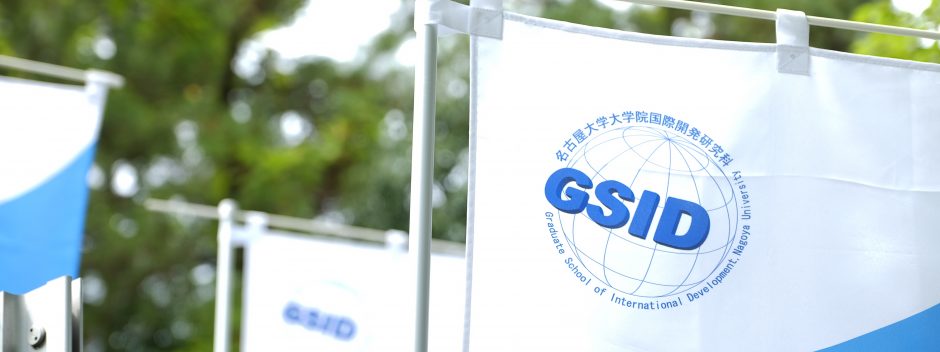Regulations of Graduate School of the International Development (GSID) Alumni Association, Nagoya University
Article 1: Name
The name of this organization is Graduate School of International Development (GSID), Alumni Association, Nagoya University.
.Article 2: Purpose
The Association is concerned with the following purposes:
- Promotion of mutual friendship and networking among its members
- Contribution to the promotion of research on international development and development studies.
- Contribution to the promotion of GSID and Nagoya University
Article 3: Tasks
In order to realize the above-mentioned purpose, the Association deals with the following tasks:
- Issuing the members list
- Projects for the interaction and networking among members
- Supporting GSID and its members including students and alumni
- Other necessary tasks to realize the aforementioned purposes
Article 4: Membership
The Association is organized with the following memberships:
- Regular membership: Past students, graduates from the regular Master and Doctoral programs, research students, and those who have obtained a doctorate by submitting a doctoral dissertation
- Supporting membership: Present/past professors, staff and research fellows
- Associate membership: Individuals, organizations, and corporations who respect the purpose of the Association, and are approved by the Executive Board.
Article 5: Officials
The Officials of the Association consist of the following:
- President (one)
- Vice Presidents (two)
- Directors (a few)
- Auditor (one)
- Advisor (appointed by the Association such as Dean of GSID, and former Presidents and Vice-Presidents of the Association)
Article 6: Election and term of the Officials
The election and official term of the Officials are the following:
- The officials stated in article 5 shall be nominated at the Executive Board, and must be approved at the General Assembly.
- The official term of office is two years. The reappointment of sitting officials to a new term of office is permitted.
Article 7: Duties of the Officials
The Officials shall perform the following duties. The executive board of the Association consists of the President, Vice Presidents, Directors, and one among them is the Accountant.
- The President generally manages the services and represents the Association.
- The Vice Presidents support the President.
- The Directors perform necessary services.
- The Accountant manages the budgets of the Association under admission of the General Assembly and the Executive Board.
- The Auditor inspects the tasks and the account, and reports it to the General Assembly.
- The advisor provides necessary advice to the Alumni.
Article 8: General Assembly
Holding of the General Assembly and decision-making are the following:
- The General Assembly is the highest decision-making body of the Association, and the regular General Meeting, in principle, shall be held every other year and determine the principle direction of the Alumni business such as budget and executive personnel. Additional General Assembly will be held if the Executive Board calls in necessity.
- The president shall call all General Assemblies.
- Decisions at the General Assembly require the approval of the majority of attending members.
Article 9: Secretariat
- The Secretariat of the Association shall be placed in GSID.
- The secretariat is responsible for the administration and management of the Association under the Executive Board.
Article 10: Branches, Groups and Committees
The Association can set up the branches (of countries, regions etc.), groups (of seminars/labs, departments/programs/majors/, academic years, occupational fields etc.) and committees in order to achieve its purpose.
Article 11: Rules
The Association can set up the rules in order to achieve its purpose.
Article 12: Account and fiscal year
- Alumni expenses shall be managed through membership fees, donations and other incomes.
- The fiscal year shall start on April 1st of each year and end on March 31st of the following year.
Article 13: Amendment of Regulations
- Amendments to regulations must be first proposed at the Executive Board meeting, and subsequently, approved by the General Assembly.
Additional clause: These regulations come into effect on July 15, 2000.
Additional clause: These regulations come into effect on July 7, 2018.
Additional clause: These regulations come into effect on October 17, 2020.
Additional clause: These regulations come into effect on July 15, 2022.

